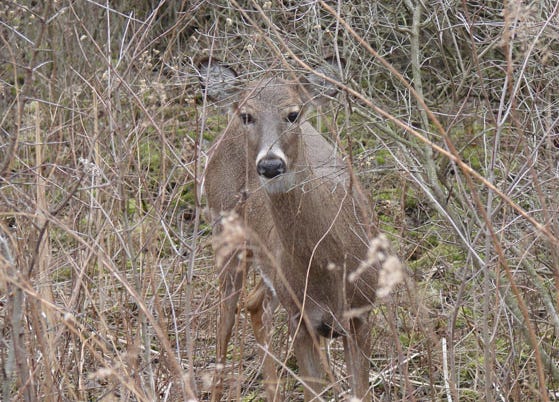
The Florida Fish and Wildlife Conservation Commission is looking to hunters to help monitor the state’s deer herd this coming season for chronic wasting disease, or CWD as it’s more commonly called. And any Florida hunter planning to hunt deer, moose or elk out of state this year needs to be aware of certain laws and regulations aimed at preventing CWD from entering our state.
CWD belongs to a group of diseases known as transmissible spongiform encephalopathies. Scientists still have much to learn about CWD, which appears to occur only in the deer family, but is believed to be caused by an abnormal protein called a prion.
Fatal CWD attacks the brains of infected cervids (mule deer, white-tailed deer, moose and elk), causing them to become emaciated, display abnormal behavior and lose control of bodily functions.
Warning signs of CWD hunters can look out for while in the field include deer that are extremely thin or appear sick, or those exhibiting odd behavior such as excessive salivating or urinating, staggering, walking in circles, standing with a wide stance, head tremors, or deer found dead from unknown causes. If you see a deer that fits this description, call 866-CWD-WATCH (293-9282).
Transmission of CWD occurs by direct contact with bodily fluids (feces, urine or saliva) or through contact with a contaminated environment. In this second scenario, the prion stays in the environment, and may remain infectious for years.
The good news is, there’s no evidence that CWD can be transmitted to humans or livestock, and it’s not yet been found in Florida or any other southeastern state. But it’s going to take the help of all hunters and the FWC to keep it that way.
Currently the only practical method for diagnosing CWD is through analysis of brain-stem tissue or lymph nodes from dead deer. Therefore Florida’s more than 200,000 hunters can play an extremely important role in CWD surveillance by providing samples from harvested deer for testing.
How to help
The FWC is collecting these samples throughout Florida, and asks that private landowners and hunting clubs participate in this surveillance effort. Since 2002, the FWC has tested nearly 9,000 hunter-killed, road-killed and sick or diseased deer for CWD.
To assist, call the toll-free CWD Hotline at 866-CWD-WATCH (293-9282) for further information and to coordinate collection and pick-up of deer samples.
To date, CWD has been found in mule deer, white-tailed deer, moose and elk in Arkansas, Colorado, Illinois, Iowa, Kansas, Maryland, Michigan, Minnesota, Missouri, Montana, Nebraska, New Mexico, New York, North Dakota, Ohio, Oklahoma, Pennsylvania, South Dakota, Texas, Utah, Virginia, West Virginia, Wisconsin and Wyoming.
It also has been detected in Canada (Saskatchewan and Alberta), Norway and in South Korea.
Deer import laws
The primary objective of CWD management is to prevent it from entering Florid, so laws now regulate the transport of harvested deer into Florida.
What is legal to bring back when hunting out of state
It’s illegal for hunters to bring into Florida whole carcasses of any harvested cervid from any of the affected states or countries.
From these areas, hunters can bring back only deboned meat and finished taxidermy mounts, hides, skulls, antlers and teeth, as long as all soft tissue has been removed. Citizens are encouraged to report illegal importation from affected areas by calling the toll-free FWC Wildlife Alert Hotline, 888-404-FWCC (3922).
Effective management
Should a CWD outbreak occur in Florida, the keys to effective management will be detecting it early and taking swift action to limit its spread. The FWC has a CWD action team in place made up of veterinarians, biologists, law enforcement officers and media members. They are ready to respond, along with other government agencies such as the Florida Department of Agriculture and Consumer Services, U.S. Department of Agriculture, U.S. Fish and Wildlife Service, Florida Department of Health and the Centers for Disease Control and Prevention.
This season, if you come across or harvest a deer that appears sick or emaciated, or one that has died from unknown causes, don’t handle it. Instead, contact the FWC, 24/7 on its toll-free hotline at 866-CWD-WATCH (293-9282).
It’s important to call as soon as possible so the carcass can be collected and tested while it is still fresh.
We all can help keep CWD out of Florida’s deer herd by staying well-informed, taking precautions and acting quickly when necessary.
For more information, go to MyFWC.com/CWD.
Tony Young is a columnist with the Florida Fish & Wildlife Conservation Commission.
This article originally appeared on Crestview News Bulletin: YOUNG: Florida hunters may help monitor deer for disease
